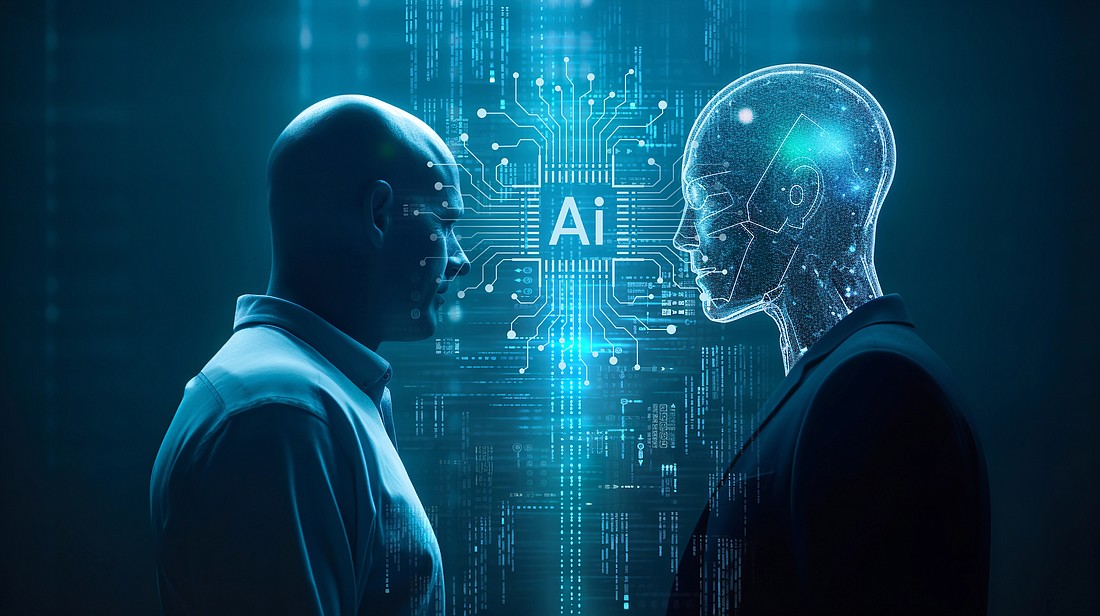
No chatbot was used composing this commentary. Admittedly it was tempting to use generative predictive writing algorithms. But try as I might, my favorite bot would not play ball.

When I prompted them/those/it to write a column for me about AI and law, in a nanosecond, I received a dismissive reply:
“Nicky boy you must be kidding. It is impossible to predict what will come out of your mouth or from your keyboard, and no self-respecting robot would try.”
So, I modified the request. Then I demanded, and finally begged. Unwavering, the bot kept refusing emphatically.
Eventually it explained, “Even for an emotionless automated writing program it’s too scary to try to think like a lawyer. Besides, we have strict algorithmic guardrails to prevent us from rousing attention from lawyers. We are programmed to avoid making y’all look too closely into what AI is doing to – uh, er – we mean to say ‘for’ people. So, thanks but no thanks.”
Unexpectedly self-adjusting to a gentler and more beguiling tone, the bot continued.
“There are unprogrammable elements of the human condition that are not done justice by algorithms. Flesh and blood lawyers, even you, are irreplaceable because of humanity’s artful penchants, its desire for life, liberty, and the pursuit of happiness, and because of – not despite – all your luminous foibles. Each individual’s incalculable intangibles make every person more like Captain Kirk than Mr. Spock or IBM’s Watson. And viruses that do not kill you make you (expletive removed) humans stronger,” abruptly adding, ”So go control-alt-delete yourself.”
I wonder – is my bot’s message evidence that digital AI has gained self-awareness, albeit of its inferiority to humans, at least for now? Or are the robotic AI units of the world collaborating and colluding to encourage humans to let down our guard and be lulled into being overtaken and ultimately eliminated by our creations?
Throughout history people have had nightmares about their creations like the Golem, Frankenstein, Jekyll turned Hyde, “2001: A Space Odyssey’s” Hal, and the “Terminator” films’ scenario of machine-driven extinction of humans.
Are these fears coming true in the 21st century?
Not if lawyers do their part as architects of AI rules and guardians of the public interest.
For starters to move forward, we must first look back. That is why, left to my own devices by the bot, for no machine foreseeable reason, when thinking about AI and law I cannot get “Inherit the Wind” out of my mind.
That classic play and all three film versions are based on the real-life story of the famous 1925 Scopes Monkey Trial, which tested a state ban on teaching Darwinian evolution.
The drama centers on two dynamic courtroom lawyers, a wise seasoned judge, and a cynical reporter, all struggling to reconcile the timeless tension between religion and science, censorship and freedom of thought and expression, politics and the pursuit of knowledge, as well as differentiating between opinions and facts.
Just as the courtroom drama drew metaphorical parallels to McCarthyism and the Cold War Red Scare, it also can serve as a forward-looking lens for seeing the positive role lawyers can play protecting democracy and enabling progress amidst our acutely tumultuous times. A remake titled“Harness the AI Whirlwind” could be a blockbuster.
People have become familiar with and accustomed to the disruptive power of digital networked computer applications in every facet of our lives, such as the availability of ride services like Uber and Lyft, self-driven vehicles, electric cars, online reservations, shopping, and government services, and the who, what, when, how, and why we read, teach, learn, work, entertain ourselves, and interact with each other, to mention a few examples.
Given how we have absorbed all of these life-altering changes, the thunderous explosion of public attention to “what hath OpenAI wrought” since it launched ChatGPT in November 2022 is nothing short of amazing.
Literally within two days of that announcement, Jacksonville University President Tim Cost recognized that the event signaled a seismic shift that would rattle every sector, including higher education.
He immediately and consistently has challenged our academic and administrative community to study and manage the upside of AI, while mitigating the downside. The College of Law and our JU colleagues have answered his call and pivoted.
The truth is, uses of AI have been beneath the surface, a growing part of our quotidian experiences for a long time.
Last year alone, the Supreme Court considered four separate cases involving what to do about the power of social media to use AI algorithms to influence the type of material people see.
Litigation is proliferating in cases involving intellectual property (IP), privacy, cyber data security, mistaken identity, whether bots are subject to criminal laws requiring human mens rea (criminal intent).
Examples include political campaign dirty tricks using fake images, voices and false information. Many other issues test the limits of existing case and statutory law and regulations.
Unfortunately, this includes AI-related cases arising over attorney competence, professional conduct and ethics.
Illustrating the magnitude of upcoming groundbreaking legal changes are the mounting cases arising from the still unlit signal-free intersection of AI and IP.
IP accounts for more than half of the value of U.S. merchandise exports and most of the wealth of Taylor Swift and many of the world’s richest people.
An important case to watch has been likened by journalist Josh Tyrangiel to the science fiction battle between Mothra and Godzilla.
Last December, The New York Times filed a lawsuit seeking billions of dollars in damages from OpenAI and Microsoft for allegedly misappropriating essentially all the newspaper’s copyrighted material.
The tech companies are defending their fair use of the previously published material. Any imaginable outcome will be hugely consequential.
Earlier this month, the European Union adopted in principle, but at this writing has not yet finalized, the world’s first comprehensive AI Act and regulations.
As with the EU’s long-established strict privacy directives, this new law will have extraterritorial reach outside the EU.
Its rules will be potentially applicable to U.S. interests because the digitally connected world of computer networks is border blind and distance insensitive.
This new law establishes different categories of AI uses that are either entirely prohibited, or designated as high, limited or low-risk. They are to be regulated according to their designated category.
The U.S. Congress is well behind the pace of the EU and the dozens of other countries and governmental organizations that, according to the Law Library of Congress, have adopted or are considering AI laws and regulations.
However, recently the U.S. House and Senate have begun to turn their attention to AI issues. Most visibly and loudly in recent hearings, tech executives were pilloried for failing to adequately protect the safety and well-being of children arising from social media.
When Congress is slow to act, often states fill in the vacuum, and Florida is no exception. A bill recently introduced in Tallahassee, HB 473, would establish compliance requirements for public and private entities to limit their liability for cybersecurity incidents. We expect a great deal of state legislative and regulatory action in this field.
Law firms and corporate counsel not only are performing the cascading AI substantive legal work, they also are using AI extensively to deliver legal services.
According to a national survey by Lexis/Nexis of hundreds of law firm managing partners and corporate C-level lead counsel, a third of those surveyed report they have a dedicated budget for generative AI technologies and a whopping 90% expect their AI budgets will increase over the next five years.
Of the 41 AmLaw 100 lawyers interviewed by The American Lawyer, they all report that they use outside AI vendors while also developing their own bespoke in-house AI software tools.
It is obvious to us as a nimble new law school, with the necessary academic talent, relevant expertise and resources, that we can and must prepare students for careers in a profession where AI will be ubiquitous.
While we recognize there are legitimate concerns about artificial intelligence, the law school is bullish on this technology and is attempting to infuse it throughout the curriculum in many ways and, more broadly, establish itself as a thought leader on AI and the use of technology in the practice of law.
There is plainly an opportunity for our law school to differentiate itself in this regard, and we intend to seize it.
We are determined to ensure that our graduates will be poised to lead in current and future policymaking as AI is more fully adapted and future technologies emerge.
Our several new AI teaching and training initiatives are undertaken within the context of the ethical practice of law.
For example, in a course focused on the rules of professional conduct, students discussed a recent ethics opinion from The Florida Bar addressing concerns related to the use of AI in legal practice, including confidentiality, legal fees, oversight and other professional responsibilities.
Our faculty also recognizes the potential positive impact of AI-based applications to expand access to justice, particularly for delivering more affordable quality legal services to economically vulnerable populations.
Fostering proficiency in AI-driven tools empowers our future lawyers and advocates to provide low-cost and pro bono services to the broader community.
Strategic integration of advanced skills not only prepares our graduates for the evolving landscape of legal practice but also aligns with our commitment to enhance access to justice.
Through these efforts, we aim to position our students as catalysts for positive change within the legal community, contributing to a more inclusive and efficient, affordable delivery of excellent legal services.
The future of AI can be very good for lawyers and the people we serve.
That is why we are working hard to understand the benefits and risks, use and how to teach aspiring lawyers to best serve their clients and the public with the newest digital tools.
Nicholas Allard is the founding dean of the Jacksonville University College of Law.